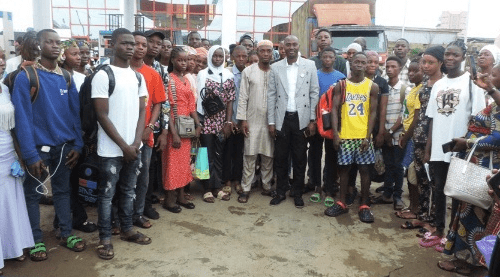At least 24 states of the federation will not be able to pay workers salaries this year without having to wait for federal allocations from the central government, findings by The PUNCH have revealed.
Only 11 out of the 36 state governments of the federation can independently pay their workers’ salaries without depending on federal allocations, according to an analysis of the state governments’ approved budgets for the 2024 fiscal year.
The states with robust internal revenue are Lagos, Kano, Anambra, Edo, Enugu, Imo, Kaduna, Kwara, Osun, Ogun and Zamfara.
The approved budgets are also contained in Open States, a BudgIT-backed website that serves as a repository of government budget data.
While the budgets of 35 states have been made public, Rivers State budget could not be accessed neither has it also been uploaded the platform.
According to the analysis the budgets data, 24 states cannot fund salaries payments from their Internally-Generated Revenue and, as such, may have to rely on the Federal Government allocations or borrowing from banks and related institutions.
The development also means that the respective wage bills of the affected states surpassed their various IGRs, raising concerns about workers productivity and state governments’ efficiency in internal revenue generation.
The 24 states are Bayelsa, Ondo, Yobe, Sokoto, Taraba, Plateau, Oyo, Niger, Nasarawa, Kogi, Kebbi, Katsina, Jigawa, Gombe, Ekiti, Ebonyi, Borno, Benue, Bauchi, Adamawa, Akwa-Ibom, Cross River, Abia, and Delta.

The development is coming amidst clamour for wage increase by labour unions at both the federal and state levels, following the rising cost of living on the aftermath of fuel subsidy removal and unification of the foreign exchange markets by the current administration.
The Nigerian Labour Congress has consistently maintained that if inflation continues to rise, the organised labour may have no choice but to insist on a new minimum wage of N1m for Nigerian workers. The government however has rejected the demand.
In the first half of 2023, state governments borrowed about N46.17bn from three banks to pay salaries between January and June 2023. The findings were based on an analysis of the half-year 2023 financial statements of Access Bank Plc, Fidelity Bank, and Zenith Bank Plc
The PUNCH observed that the states borrowed the most from Access Bank in six months, with a record of N42.97bn loan.
This was followed by Zenith Bank (N1.78bn borrowed) and Fidelity Bank (N1.42bn borrowed) within the six-month period.
In 2023, state governors got the most FAAC allocations in at least seven years. The rise in FAAC allocations to the three tiers of government especially states followed the petrol subsidy removal and currency reforms of the current administration. The reforms have reportedly led to a 40 per cent boost in income.
Experts believe the projected revenue increase should have reduced state governments’ appetite for more borrowings.
In an interview recently, Kaduna State Governor, Uba Sani, claimed that state governments were borrowing to salaries in the past but the removal of fuel subsidies had put an end to such borrowing.
“Every governor in Nigeria is getting more money than we used to get. Before President Bola Tinubu removed the fuel subsidy, in Kaduna State, precisely in May 2023, we were borrowing to pay salaries but immediately after the subsidy removal, after paying salaries without borrowing, we had a surplus of money.”
However, despite the improved funding, no fewer than 32 states indicated plans to borrow N2.78tn from domestic and external institutions to fund their 2024 budget.
According to further analysis of the states budgets, the affected 24 states will spend N1.48tn on salaries in 2024, while they plan to make N914bn IGR. This means the states will need N566bn from either federal allocations or borrowing to complete the payment of salaries.
The breakdown of data shows that Bayelsa State with projected IGR of N23.9bn will need money to pay its workers N69.12bn this year. Ondo State with projected internal revenue of N33.6bn will also need extra money to fund its N56.76bn annual wage bill, while Yobe State will fund its N42.86bn wage bill from its projected IGR of N14.55bn and federal allocation or borrowing.
Sokoto is expected to pay N46.9bn salaries from its anticipated internal revenue of N37.1bn and partial funding from allocation/loan, while Taraba will obtain extra funding to pay its workers N54.47bn from its internal revenue of N27.8bn. Plateau with a projected revenue of N38.89bn must get federal government allocation o clear its wage bill of N52.25bn.
Also, the Oyo State will pay N132.67bn to workers after generating N92.79bn in its coffers. The state will need additional funding to complete this. Niger State with projected revenue of N61.87bn will need help to pay its civil servants N70.24bn while Nasarawa will pay its workers N54.45bn from its projected revenue of N43.3bn and another source.
Further analysis of the budget showed that states such as Kogi will pay its workers N65.07bn from its revenue of N30.23bn and federal allocation, while Kebbi will pay N37.3bn as salaries from its N17.8bn internal revenue and partial federal allocation. Katsina will spend N56.3bn on salaries from its N40bn internal revenue and federal allocation, while Jigawa will pay its workers N64.84bn from its revenue of N50.64bn and federal allocation.
Gombe must pay salaries worth N35.27bn from its anticipated revenue of N22.32bn and federal allocation. Ekiti will spend N2.78bn on salaries from its N1.5bn revenue and federal allocation. Ebonyi’s N28.16bn wage bill surpasses its revenue of N25.1bn, while Borno will pay its workers N50.28bn from its revenue of N27.5bn and federal allocation.
Furthermore, Benue State with revenue of N23.9bn will pay N56.9bn as salaries, while Bauchi must pay salaries worth N46.9bn from its anticipated revenue of N37.1bn and federal allocation; Adamawa will spend N52bn on salaries from its N26.9bn revenue and allocation; Akwa-Ibom will spend N127.8bn on salaries from its N60bn revenue and allocation while Delta with projected revenue of N110.3bn must seek assistance to pay its workers N164.3bn.
Also, Abia with a revenue of N32.14bn will pay N47.83bn as salaries while Cross Rivers with projected revenue of N34.7bn must seek assistance to pay its workers N67.75bn.
According to the budget data, the 11 states which have higher IGR will conveniently fund their combined 980.68bn wage will their internal revenue of N2.34trn
Experts speak
In different forums, financial experts have raised concerns about states’ spending on recurrent expenditure highlighting the need to embrace financial innovations.
A development economist, Aliyu Ilias, said many states had yet to fully develop themselves as industrialised and marketable to attract investors.
Ilias urged governors to develop an area of strength they could leverage to attract foreign investments.
He said, “Going forward, what they could do is to identify one area of strength. For instance, Bayelsa has oil and should be able to attract investments. I think it is about policy. They should give the policy a chance that would allow people to come and invest. They should also create an attraction and develop an economic summit that will make sure they showcase and attract investors.”
An economist and former Vice-Chancellor of the University of Uyo, Prof Akpan Ekpo, also stressed that, “states have to think of new ways of increasing their IGRs. If they continue borrowing to pay salaries, it is not good for the economy.”
He urged the states to increase their revenue by increasing service delivery, which will attract more revenue.
Also reacting, the Managing Director of the Centre for the Promotion of Private Enterprise, Muda Yusuf, said that the report indicated that a majority of states were not financially sustainable and were at risk of insolvency if there was no boost in investment.
He said, “This issue is a fiscal sustainability problem, showing that many states are not fiscally sustainable and need to work towards it; and that the states need to do a lot more to attract more investments to their states so that their level of dependence on the Federal Allocation Accounts Committee would reduce.
“Even as we speak, many of them are also in debt and by the time they pay salaries and service their debts, there is not much left to improve on infrastructure. It’s in the interest of the sustainability of the states for them to be more creative in generating more revenue and attracting more investment to their states so that they can generate more revenue.
“Secondly, we also need to address the issue of fiscal federalism because some of the states don’t have power over some resources in their domain and can’t bring investors into it. For instance, mining is controlled mainly by the federal government, you get permission from them and revenue is remitted to them. So we need to revisit the issue of restructuring to help states have more control over resources within their domain.
Continuing, the economist stated that the state governors should take a cue from the Federal Government to reduce its bloated staff and political appointees.
“Most of these states have heavy overhead and they have very bloated bureaucracy, political appointees and they are putting a lot of pressure on their resources, so they have to do some rationalisation on their staff, many of them don’t need more than 50 per cent of their workforce but for political reasons, they put all manner of characters on their payroll including the local government. They have to look at that and take a cue from the Federal Government on the Oronsaye report.”
Punch





















